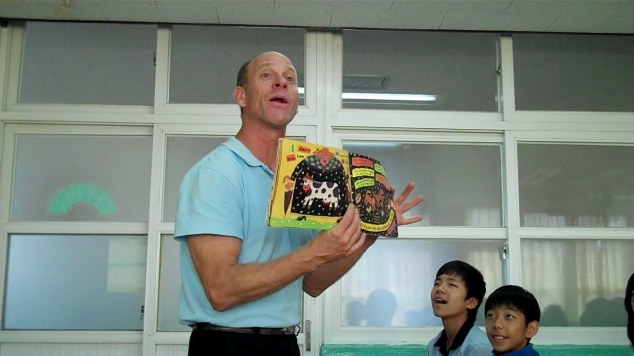The Teachers Talking about Self-compassion series is a place to learn about self-compassion from teachers around the world. And today, I am excited to present the first guest, Chaz Burton.
I first met Chaz in 2009 at our Nonviolent Communication (NVC) practice group where for a few treasured years, a group of dear friends used to meet once a month to practice this form of compassionate communication. I have learned a great deal from Chaz about empathy (a core teaching in NVC), and was grateful he agreed to answer the series’ three questions so you could learn from him as well.
In what country or countries do you currently teach? What subject or skills do you teach?
I currently teach high school English in Jinan, China. Living in China in many ways requires a lot of self-compassion, for it can be quite difficult to live here, due to language barriers, inconsistent and restricted internet, some of the worst pollution in the world, crazily crowded and noisy streets and the difficulty in finding healthy food.
What strategies do you use to practice self-compassion/self-care?
Through the teachings of many practitioners of NVC and other teachers, I have gained some specific attitudes and strategies that help me extend self-compassion when challenges arise. The main one is to pause for a moment, recognize and name that I am being challenged. The next step is to take a deep, conscious breath, and remind myself that I am a human being, that all human beings experience challenges, and virtually all go through cycles of self-criticism and blame. (which is most of the time then projected onto others) These strategies are very significant steps in offering myself compassion.
…pause for a moment, recognize and name that I am being challenged. (click to tweet)
Beyond this, I remind myself, that I was, and am, doing the best that I could or can. This often takes some time, as the “jackal voices” – the voices of self-criticism – are trying to drag me down into the morass of self-blame and condemnation. At this point, if I am conscious (or maybe just lucky) the words of one or more of my “teachers of compassion” arise in my mind, such as “May I give myself the kindness and compassion I need right now,” or “I’m doing the best I can right now and I give myself full permission to really be with, without judgement, whatever I am feeling or need to feel.”
Why is self-compassion/self-care important to you in terms of the work you do as a teacher?
The axiom that actions speak louder than words is certainly true for my students; they learn as much or more from what I do than from what I say.
Just like me they make mistakes all the time in their struggle to identify and fulfill their potential. Having taught in Asia for six years, I find this particularly true of Asian kids; there is so much pressure for them to “perform” that it is easy for them to get caught in self-condemnation and lack of self-confidence.
The more I can model self-compassion, the more I can be compassionate with them, and the more they learn it, implicitly and explicitly.
————-
In addition to being a teacher, Chaz is also the founder of the Terra Promus project. Terra Promus helps him — and leads participants — to keep hope for a loving, just and sustainable world, which he admits is increasingly difficult to do. Follow the important work Chaz is doing by subscribing to the Terra Promus website, and following the Facebook page.


It’s good to re-read this, cuz I’m having one of those stressful days of teaching, and I need to heed my own advice!
LikeLike
I’m happy to hear that your words are serving you well! Thank you again for giving us insight into this precious practice. May you find peace today my friend.
LikeLike
Thanks….peace back atcha!
LikeLiked by 1 person